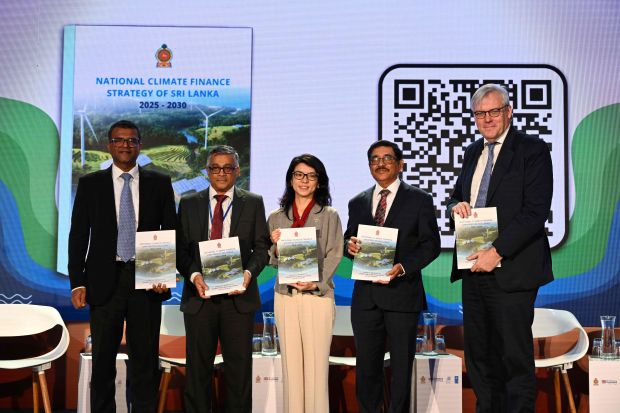Financing Sri Lanka’s climate future: A joint call for action
By Azusa Kubota and Dr Harshana Suriyapperuma
As Sri Lanka emerges from an unprecedented economic crisis and embarks on a path of reform, the launch of the National Climate Finance Strategy of Sri Lanka (2025-2030) marks a defining moment in the country’s development journey. It is a signal that climate action is foundational to national priorities and central to Sri Lanka’s economic recovery, fiscal reform, and long-term development. Unchecked climate impacts could cost up to 15% of the global GDP by 2050 under 2°C of warming, rising to 30% by 2100 under 3°C.
While global climate finance is growing, it needs to be accelerated. In 2023, US$1.9 trillion was mobilized globally, with early estimates suggesting that 2024 flows surpassed US$2 trillion for the first time. Yet, this falls short of the US$6.3 trillion needed annually to meet global climate goals between 2024 and 2030.
For Sri Lanka, this global gap has real consequences. It is estimated that around US$10.85 billion alone will be required by 2030 to finance Sri Lanka’s mitigation commitments under the Nationally Determined Contributions (NDC 2.0), as articulated by the Ministry of Environment for the period from 2021 to 2030.
With evolving climate risks, the National Climate Finance Strategy of Sri Lanka (2025-2030) recognizes that climate action is a strategic investment in the country’s future prosperity, stability, and global competitiveness. It can provide a clear pathway to accelerate progress on Sri Lanka’s international and national climate commitments.
The National Climate Finance Strategy of Sri Lanka (2025-2030) comes at a time when Sri Lanka is rebuilding its economy, restoring investor confidence, and reimagining its development model. The Ministry of Finance, Planning, and Economic Development’s decision to engage in Climate Budget Tagging and a Climate Public Expenditure and Institutional Review will facilitate a formal recognition of ongoing proactive government support for climate action with greater clarity and transparency.
Unlocking the Potential of Nature and Sustainability with Innovative Financial Instruments
As one of the world’s 36 biodiversity hotspots, Sri Lanka’s forests, coastlines, ecosystems, and rich biodiversity are ecological treasures that are frontline defences against climate change, and also key economic assets. These natural systems, which protect communities, sustain livelihoods, and buffer the economy against shocks, need to be protected, conserved, and restored to mitigate intensified climate impacts from rising temperatures to coastal erosion and extreme weather events.
Recognizing this, the National Climate Finance Strategy of Sri Lanka (2025-2030) prioritizes sectors such as sustainable tourism, the blue economy, and climate-smart agriculture for investment. These sectors offer high returns in jobs, resilience, and long-term development.
The National Climate Finance Strategy of Sri Lanka (2025-2030) introduces a suite of twelve financial instruments tailored to mobilize capital and unlock stories of transformative impact, where finance meets people, nature, and innovation. By promoting nature-based solutions, natural capital accounting, and a green revolving fund, the Strategy harnesses the power of nature to drive inclusive growth. It also supports carbon market development, enabling Sri Lanka to monetize its climate actions, attract international finance, and strengthen its position in global climate leadership.
The Strategy fast-tracks Sri Lanka’s development across three converging tenets: nature, climate, and sustainable land–ocean landscapes. It directs finance toward sectors, such as renewable energy and resilient infrastructure, to meet the NDCs, support nature-based solutions and sustainable tourism to advance National Biodiversity Targets (NBTs), and promotes sustainable agriculture and land restoration to achieve Land Degradation Neutrality (LDN) targets.
These instruments are designed to de-risk climate investments, mobilize private capital, and leverage international partnerships. They reflect global best practices while being grounded in local realities, ensuring that Sri Lanka’s climate finance journey is both ambitious and achievable.
A Partnership-Driven Approach
The development of the National Climate Finance Strategy of Sri Lanka (2025-2030) has been a collaborative effort. Spearheaded by the Ministry of Finance, Planning and Economic Development — with technical support from UNDP and financing from the Government of the United Kingdom — it is a testament to the kind of multi-stakeholder partnership needed to drive meaningful climate action. Throughout the process, the Ministries of Finance and Environment, NDC sector stakeholders, the development partners, and the private sector closely engaged to ensure the Strategy is inclusive, evidence-based, and actionable. UNDP has already extended its support to leverage the climate finance solutions outlined in the Strategy, helping Sri Lanka mobilize the financing needed to address its climate finance gap. Turning the Strategy into action will require collective efforts from the government, the private sector, civil society, and development partners.
Looking Ahead: From Strategy to Action
The National Climate Finance Strategy of Sri Lanka (2025-2030) sets the course for 2025 to 2030, with the first review scheduled for 2027. Its success will depend on how well the Strategy has been implemented and integrated into the country’s development narrative. It will also require continuous institutional and stakeholder engagement.
Launched on the International Day of Climate Action, the National Climate Finance Strategy of Sri Lanka (2025-2030) is envisioned to be a platform for transformative development, and we hope that it is leveraged to finance a future that is green, inclusive, and resilient.
Sri Lanka’s proactive commitment to climate action is reflected in this Strategy, which complements the Government’s vision.
The Strategy is an invitation for partnerships that unlock finance, innovation, and impact. With COP30 having set the tone for strengthened multilateralism, Sri Lanka has a unique opportunity to demonstrate how climate finance can drive inclusive and resilient development.
-Azusa Kubota, Resident Representative, UNDP Sri Lanka & Dr Harshana Suriyapperuma, Secretary, Ministry of Finance, Planning and Economic Development



Comments are closed, but trackbacks and pingbacks are open.